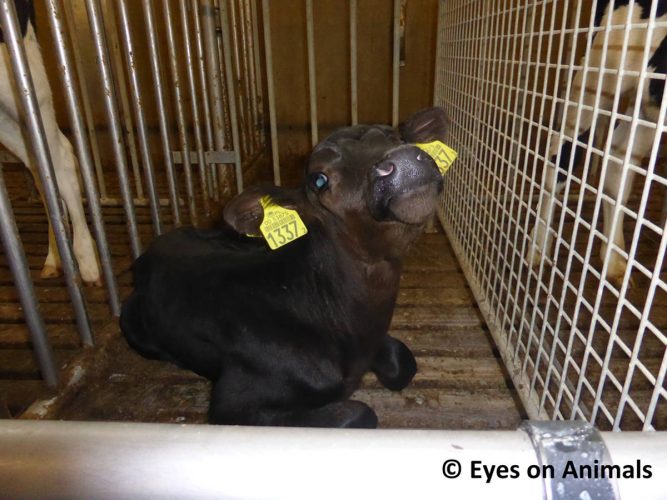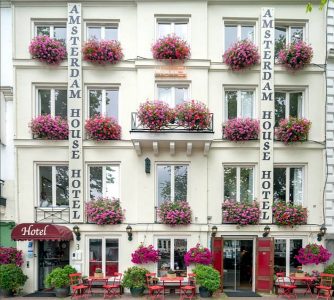Today Eyes on Animals and L214, with assistance from Ethical Farming Ireland, are publishing the findings of their recent investigation into the long-distance transport of unweaned calves. The investigation, conducted in March 2020, shows the plight of calves born in Ireland and exported to intensive veal farms in the Netherlands.
Four different countries are crossed, 2,000 km traveled, more than 50 hours of transport: this investigation demonstrates the irresponsibility of the EU and Member State governments which are determined to maintain this trade route even in times of a pandemic.
At a time when more and more countries are locked down and people are told to stay at home, we continue to transport live animals as if nothing had happened. Meanwhile, transport is a major cause of spreading corona further.
The virus can live on the surface of truck equipment and animals on board and travel this way. It can also be transmitted between the various people involved in this trade: from the Irish farmers and traders who sell these calves on the cattle markets to the international truck drivers, veterinarians or veterinary inspectors, custom officials, employees of the control post in France, to the Dutch veal farmers. These calves are transported to farms where they will be fattened for 6 months. Keeping these calves en route is not a question of preventing a food shortage since these calves will not be killed and transformed into meat for another 6 – 7 months. This non-essential transport poses unnecessary risks to public health.
The investigation reveals harsh transport conditions for these 2 to 3 week old calves. These young animals are weakened by the long journey and hungry and thirsty due to the lack of adequate feeding systems on board the trucks and being withheld from adequate feed for longer than the EU maximum time of 19 hours. After being confined on the trucks for 26,10 hours without any feed/milk, as documented by Eyes on Animals and L214, the unweaned calves are unloaded at the Couville control post, near Cherbourg, to be finally fed, but in a hurry. As one can see in the video footage, the calves are kicked and beaten with sticks during the feeding session in order to move them through quickly as almost 2000 calves, still wobbly on their legs, have to be processed by just a few people. After a 13-hour stop, they are reloaded again into the livestock trucks and transported for another 900km to the Netherlands.
L214, Eyes on Animals and Ethical Farming Ireland, along with 35 other international NGOs, recently sent a letter to the European Commission to demand:
- An immediate ban on the transport of animals longer than 8 hours
- An immediate ban on the transport of animals by sea
- An immediate ban on animal exports to third countries
Lesley Moffat, director of Eyes on Animals: “It is very disturbing that this trade route, which has been violating the EU regulation on minimum feeding times and humane handling of unweaned calves for years now, is still going on and no improvements have been made despite alerting authorities and industry stakeholders of our concerns. Even more outrageous is that this non-essential, purely economical trade is maintained right now during a pandemic. This shows complete irresponsibility from the EU and national authorities and exporters/importers. There is a disregard for the welfare of animals and human beings.”
→ URL of film investigation on Youtube
→ Read the full report
→ View and download raw footage of the investigation
→ Sign the petition
Inquiries from journalists can contact us via:
Lesley Moffat – English: lesley@eyesonanimals.com
Madelaine Looije – Dutch: madelaine@eyesonanimals.com
The investigation
In early March, four teams from Eyes on Animals and L214 investigated the transport conditions of unweaned calves loaded onto trucks in Ireland, transported via a roll-on roll-off ferry to northern France and then onwards via Belgium to intensive veal farms in the Netherlands. 21 cattle trucks were on board the ferry of the Swedish company Stena Line, which left on Tuesday March 3, 2020 at 22:55 from the port of Rosslare in Ireland, and arrived on Wednesday March 4, 2020 at 16:30 at the port of Cherbourg. Unloaded at a control post in Couville, near Cherbourg, the calves are handled roughly as shown in the footage. After a 13-hour stop, they are reloaded in the trucks. The animals will not arrive at their destination, an intensive veal farm in the north of the Netherlands until Friday March 6 at 01:00. They will have traveled more than 2,000 km and crossed 4 countries (Ireland, France, Belgium, Netherlands), despite their young age which makes them particularly vulnerable to transport stress. They are exhausted, weak, hungry and thirsty. Some, too weak to stand, have to be euthanized along the way.
Urgent request to the European Commission to prevent the spread of Covid-19
38 European animal-welfare NGOs (including L214, Eyes on Animals and Ethical Farming Ireland) and 42 MEPs sent letters to the European Commission in the middle of March to remind the officials of the health risks of transporting live animals throughout different countries during a pandemic. Ensuring the EU legislation on the protection of animals during transport is adequately checked, enforced and maintained in these times of crisis is impossible. Already there is a lack of personnel available to perform these tasks and time is now focused on other priorities.
The virus can survive on the surface of truck equipment and animals and travel from point A to point B this way. It can also be transmitted between the various international people involved in this trade: from the Irish calf traders and farmers who sell these calves on the cattle markets to the international truck drivers, veterinarians and veterinary inspectors, custom officials, employees of the French control post and the Dutch veal farmers.
Today the situation at borders, including those inside the European Union, is becoming more and more uncertain and changing daily in order to fight the spread of the virus. Long delays result in livestock trucks having to wait hours or turn around. As well, farm animals loaded on vessels and ferries are facing more and more complicated procedures: the waiting times at certain ports have tripled. And if a truck driver becomes sick during a long-distance export journey, like this one of several days from Ireland to the Netherlands, what happens to the animals stuck on board if the driver cannot continue?
The welfare and health of animals during transport are often of serious concern even during “normal times”. They are now further degraded due to the irresponsibility of the European Commission and Member States continuing to support long distance exports of live animals during a pandemic.
Eyes on Animals, L214 and Ethical Farming Ireland fully endorse the statements made in the letter by 38 NGOs and 42 Members of Parliament and insist that the European Commission:
- Do everything in their power to put an immediate stop on all long distance transport of animals (above 8 hours)
- Do everything in their power to put an immediate stop to all transport of animals by sea
- Do everything in their power to put an immediate stop to the export of animals from the EU to third countries.
Please sign the petition by Eyes on Animals and L214
The trade in unweaned calves in Europe
Ireland has almost as many cows as people. In 2019, Ireland exported over 200,000 unweaned calves, mainly to Spain and the Netherlands. Also last year, more than 1,300,000 unweaned calves were transported between European countries. The majority leave from Germany, France, Poland or Ireland to be fattened in particular in the Netherlands, Italy or Spain.
Couville control post, near Cherbourg (France)
Located in the commune of Couville near Cherbourg there is a control post approved by the EU, where calves on long-distance journeys can be unloaded to be fed and rested.
The center has the capacity to house 2000 unweaned calves, or 300 adult cattle. It is open 24 hours a day. Footage taken inside this year reveal the mistreatment that takes place there. Operators rush the calves through to be fed milk. The calves, desperately hungry, try to grab on to a teat for as long as possible until an operator comes and hits them with sticks to get them to move on. Some operators even kick the calves and hit them on the head to make them move faster. One calf unable to stand is dragged by his legs.
During our investigation last year of this trade route, we revealed even worse physical abuse of calves at the competitor’s control post in Tollevast near Cherbourg, Qualivia. Here calves were repeatedly hit on their heads and even jumped on and thrown about. Unnecessarily rough treatment is rampant at these control posts, where thousands of young animals, still wobbly on their feet, are rushed through to be fed.
→ View short film of our 2019 investigation
The Hell of Intensive Veal Farms
The Netherlands has the highest density of calves in the world. The Dutch were the pioneers of the intensive veal industry, keeping calves on slatted floors (without litter letting the excrement pass in a pit below) in small barren pens. Aside from not being able to move much, the calves are always kept indoors. Dutch veal farms are very specialized. The first Dutch veal farmers began by fattening the unwanted calves from their own national dairy industry, but they soon became so specialized and efficient in producing veal cheaply, that they quickly started to import unweaned calves from all over Europe.
The Dutch have many of their own calves from their large dairy industry, but on top of that they imported 717,134 unweaned calves in 2019, mainly from Germany, Belgium, and Ireland. After raising them for veal for 6-7 months, they slaughter them, then re-export 95% of the veal obtained, of which 80% goes to Italy, France and Germany.
The livestock truck trailed by a team of investigators from L214 and Eyes on Animals from Cherbourg to the north of the Netherlands delivered just under 300 Irish calves to one of these veal factory farms. The owner states on his website that his veal is particularly appreciated by French and Italian consumers.
Veal, a by-product of the dairy industry
In the majority of cases, calves fattened for veal come from the dairy industry. The dairy industry consider them as “waste” or “by-products”, because to produce milk, a dairy cow must give birth to a calf each year but the calves are not needed. Only a minority of the new-born female calves is kept to renew the herd, the dairy farmers get rid of all the others (males and females).
Calves, usually at 8 days of age but sometimes up to 3 weeks of age, are removed from the dairy farm and sold for a few dozen euros to veal farmers (from 60 to 140 euros approximately, 89 euros on average within the European Union).
Inquiries from journalists can contact us via:
Lesley Moffat – English: lesley@eyesonanimals.com
Madelaine Looije – Dutch: madelaine@eyesonanimals.com


